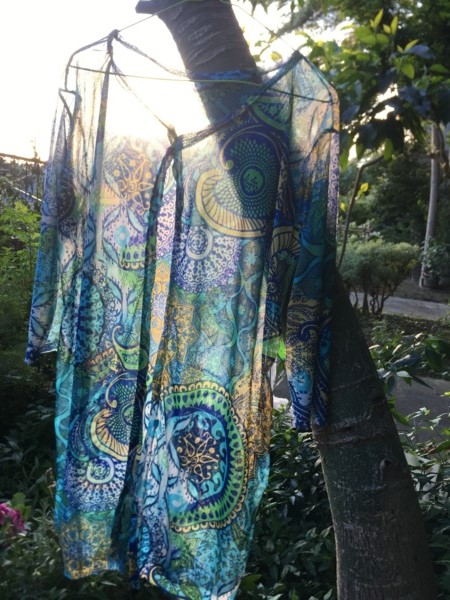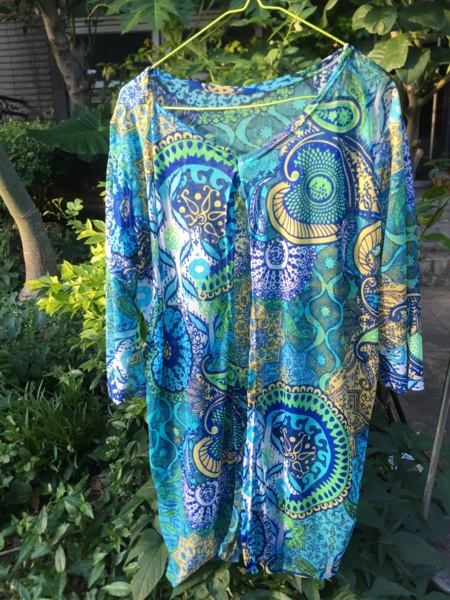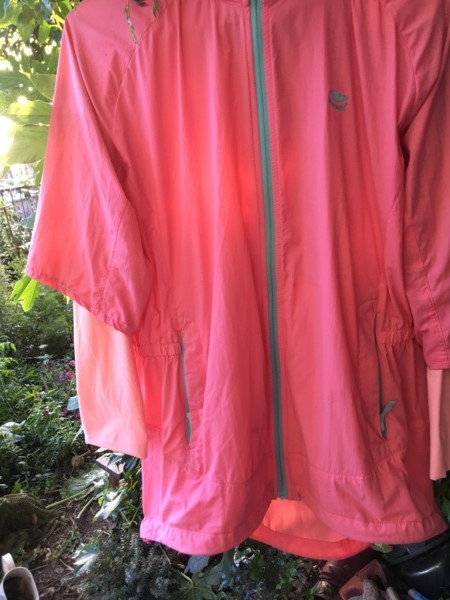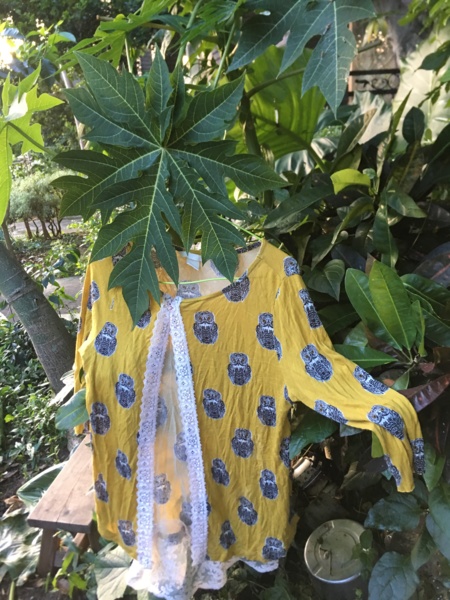

 字體:小 中 大
字體:小 中 大 |
|
|
|
| 2020/05/17 18:53:30瀏覽641|回應0|推薦15 | |
"自煮"防疫下, 變多肉了. 以前車的衣服都顯肉肉. 該想辦法遮肉肉才是. 種的多肉在陽光下日光浴
這塊布是今早在新明市場買的. "Oh布"店家在fb 也有. 每周日在新明擺攤. 2碼半才150nt.
拍照才看清楚, 右下是一隻大毛毛蟲, 右上剛好一棵心型蕨類植物 輕透清爽的布.
翻了一下儲藏室衣服, 找到了這件輕量外套, 袖子已經許多污點已無法去除. 丟了也可惜. 就 把長袖防曬外套的袖子剪短, 再車個粉紅的N66超細透氣防曬袖套...很配 運動布還是N66好. 細軟 輕量又透氣舒適
已經穿不下的長袖T , 很喜歡, 但身材應該短時間回不去 改外套, 中間剪一刀, 兩邊車蕾絲, 後背再接一片蕾絲 upcycling my outfit 還有車一件短褲, 特別用麻紗平織布車的. 方便我種菜居家短褲. 腰頭設計只要褲子不要掉下來為原則 拿我兒的短褲當版, 再加大半吋. 清涼短褲是夏天必須要的..口罩我就不再車了 保持1.5m 距離. I like self isloation...life is "short" dont waste my energy on others. Hot & Self-Isolation..=>sewing, biking, gardening, cooking....
Self-Isolation, Learned from a Life at Sea Liz Clark / 5 Min Read / Surfing Captain Liz Clark’s been self-isolating aboard her sailboat Swell since 2005; here she provides her experiences and insight for navigating isolation during a pandemic. Isolation for two. Captain Liz and Tropicat’s afternoon sway on Swell. Liz Clark For most of my adult life, I chose a lifestyle of isolation aboard my sailboat, Swell. At first, solitude and the unknown brought up fears of scarcity and loneliness. But once I got out there, I realized those fears were unfounded, and that a slower, more isolated life holds numerous benefits, both for me and the environment. Within a short time, the important things in life became more apparent—my family, my health, food and shelter. This made life delightfully simpler. Not being able to dash to the store forced me to be resourceful and creative with what was on hand. I found great satisfaction in finding the perfect upcycling use for what otherwise would have been trash. The litterbox for my cat Amelia (aka Tropicat) was made from a discarded plastic motor oil container that I found in a boatyard. I fashioned a coral-friendly dinghy anchor out of an old brake drum and a piece of floating line from a discarded fishing net. Old sails became sun covers, worn-out wetsuits became chafe guards, plastic bags were washed and reused countless times, broken equipment rebuilt, and custom upgrades made from just what I had onboard. Repurposing saves money, stimulates the mind, and lightens our footprint. I also gained a deeper appreciation for simple things, especially food. Since stores weren’t always accessible, wasting food was out of the question. Meals centered around maximizing my provisions by asking myself, What’s going to go bad first? I quickly learned that overstocking meant food got stale or moldy before I could finish. Rather than over-provisioning, it was better to do more with less. I learned to use the whole fish, cherish those broccoli stems, rotting bananas became banana bread, a quick reheat in the oven brought the crunch back to chips, and that flying fish stranded on the deck did not die in vain. But when I had crew aboard, I often stashed dark chocolate bars in my underwear drawer. And they would go bad because I felt too guilty eating them alone. Hoarding food and household supplies might momentarily make us feel more secure, but it’s not in the spirit of solidarity and compassion that we must embrace to overcome this pandemic. Plus, much of it will likely be wasted. Food waste accounts for roughly 8 percent of the global greenhouse gas emissions causing climate change and 1 in 9 people in the US are food insecure! Donating to local food drives is a good thing to do if you’ve overpurchased. We’re all in this together. Captain Lizzy knows a thing or two about only buying what you need and making use of it all. Tahui Tufaimea Along with learning how to do more with less, there have been many personal benefits of spending time alone. Isolation helped me to get to know myself like never before. I began to notice my moods and bodily rhythms and shape my days accordingly. Increased self-awareness and less distraction amplified my intuition. And those tendencies in my character that I suspected I needed to work on became clear. I kept a daily journal on Swell that helped me check in with myself. I made lists of things I could improve on, and goals and dreams for the future. And slowly but surely, I became comfortable sitting in meditation and connecting to a dimension beyond the physical. When you can’t go out, go in. If I was feeling tugs of loneliness, or inspiration ran low, immersing myself in nature always lifted my spirits. Fresh air renewed, the swirling clouds inspired, the sea surface soothed, the sun rays uplifted, the expansive horizon restored hope. Solitude in wild places also opened up a spiritual connection to the Great Mystery all around me. I felt the unity of all things, and that made me feel like a part of something wonderful. When possible, get out and explore those trails near your home, spend a night under the desert sky, or take a long beach walk. Even if it’s just sitting out in the backyard, it feels good. Be present, dissolve into the details, and let nature work its restorative magic. While spending long periods in one small area, I also found it important to maintain my space. Keeping Swell clean, organized and well-functioning was necessary for staying seaworthy, but also for staying sane. Tidying up, oiling that squeaky hinge, cleaning out your closet and making a donation pile and fixing the dings on your magic board all can make you feel more in-control. And don’t forget to maintain yourself. Is it time to change your shirt and brush your teeth? I know from experience that isolation can lead to ‘slackening the lines’ on hygiene. Honestly, my hairbrush is one of the least used items on Swell, but when it’s time, it’s time … you’ll know. I often slacked on exercise too when I couldn’t surf or swim, because it wasn’t easy on a small, rocking boat, but I always felt better when I found a way to get moving at least once a day. And when the inspiration hit, doing something creative—like drawing or trying a new recipe—also helped. Liz Clark highlines across a wall of green somewhere in Northern Sumatra. Tim Davis An extended period of solitude can be testing, but sailing with crew and being isolated together nonstop has its own set of challenges. There are lots of opportunities for connection, but also for miscommunication. I learned very quickly that being lovingly direct, and checking in with each other often, can bring up the vibe, dissolve anxieties, and keep a minor misunderstanding from becoming a storm of tension. Some ‘alone time’ every day—even if it was just reading for a bit or listening to music in my headphones—also helped me recharge and have the energy to be emotionally available with my crew again. And then there was the luxury of time—there seemed to be more of it when isolated. Time to be present, time to reflect. Time to dream. Time to be still. In the modern whirlwind of life, this COVID-19 ‘time-out’ some of us are experiencing is a chance to be more present than usual—with ourselves and our loved ones. It’s a rare hiatus from demanding routines, providing a moment to think about where we are in our lives, and where we are going. Time to consider our habits. Our patterns, our beliefs, our purpose, our focus as humans. The trajectory of humanity. Do we want to alter course? How can we steer toward the life of our dreams, help others more and restore ecological harmony on the planet? How can we re-imagine a world where all beings can thrive? To read more stories from Captain Liz, check out her book, Swell: A Sailing Surfer’s Voyage of Awakening. It’s also available as an audiobook, or as an e-book.
|
|
| ( 休閒生活|旅人手札 ) |













